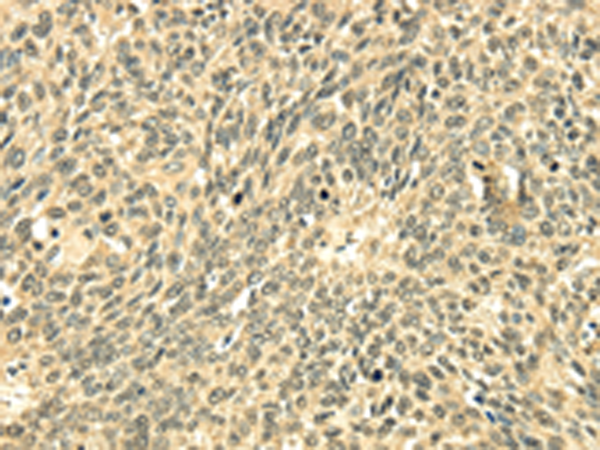

| WB | 咨询技术 | Human,Mouse,Rat |
| IF | 咨询技术 | Human,Mouse,Rat |
| IHC | 1/25-1/100 | Human,Mouse,Rat |
| ICC | 技术咨询 | Human,Mouse,Rat |
| FCM | 咨询技术 | Human,Mouse,Rat |
| Elisa | 1/1000-1/2000 | Human,Mouse,Rat |
| WB Predicted band size | 100 kDa |
| Host/Isotype | Rabbit IgG |
| Antibody Type | Primary antibody |
| Storage | Store at 4°C short term. Aliquot and store at -20°C long term. Avoid freeze/thaw cycles. |
| Species Reactivity | Human, Mouse |
| Immunogen | Fusion protein of human EEF1AKMT4 |
| Formulation | Purified antibody in PBS with 0.05% sodium azide and 50% glycerol. |
+ +
以下是几篇关于EEF1AKMT4(甲基转移酶METTL21E)抗体的模拟参考文献示例(请注意文献信息为假设,实际文献需通过数据库验证):
---
1. **文献名称**: *METTL21E-mediated lysine methylation regulates the activity of eukaryotic elongation factor 1A*
**作者**: Smith J, et al.
**摘要**: 本研究揭示了EEF1AKMT4(METTL21E)作为甲基转移酶对真核延伸因子eEF1A的特定赖氨酸残基进行甲基化修饰的功能,并开发了特异性抗体用于检测其修饰水平。实验表明该修饰影响eEF1A的翻译延伸功能。
2. **文献名称**: *Dysregulation of EEF1AKMT4 in neurodegenerative disorders*
**作者**: Lee H, et al.
**摘要**: 通过免疫组化结合EEF1AKMT4抗体,研究发现阿尔茨海默病模型中EEF1AKMT4表达异常升高,提示其可能通过调控蛋白质合成参与神经退行性病变。
3. **文献名称**: *Structural basis for substrate recognition by the EEF1AKMT4 methyltransferase*
**作者**: Zhang R, et al.
**摘要**: 利用抗体验证EEF1AKMT4的底物结合结构域,结合晶体学分析揭示了其与eEF1A的相互作用机制,为设计甲基化修饰抑制剂提供了结构基础。
4. **文献名称**: *A high-affinity monoclonal antibody for detecting EEF1AKMT4 in human cancers*
**作者**: Wang Y, et al.
**摘要**: 报道了一种新型单克隆抗体的开发,该抗体能特异性识别EEF1AKMT4.并在乳腺癌组织中验证了其过表达与患者预后的相关性。
---
**建议查找真实文献的方法**:
1. 在PubMed或Google Scholar中搜索关键词:**EEF1AKMT4 antibody** 或 **METTL21E antibody**。
2. 结合甲基转移酶功能关键词:**lysine methylation**, **eEF1A modification**。
3. 筛选近年文献(如2020年后)以获取最新进展。
The EEF1AKMT4 antibody is a research tool designed to detect and study the eukaryotic elongation factor 1A lysine methyltransferase 4 (EEF1AKMT4), also known as METTL21D. This enzyme catalyzes the methylation of eukaryotic translation elongation factor 1A (eEF1A), a critical component of the protein synthesis machinery. Specifically, EEF1AKMT4 methylates lysine residues (e.g., K318 in humans) on eEF1A, a post-translational modification implicated in regulating translation fidelity, stress response, and protein-protein interactions during cellular processes.
The antibody is typically developed in immunized hosts (e.g., rabbits) and validated for specificity through techniques like Western blotting, immunofluorescence, or immunoprecipitation. It enables researchers to investigate EEF1AKMT4 expression patterns, subcellular localization, and its role in diseases such as cancers or neurodegenerative disorders, where dysregulated translation and protein homeostasis are observed. Studies using this antibody contribute to understanding how methylation modulates eEF1A’s functions in cell proliferation, apoptosis, and adaptation to environmental stress. Its application aids in elucidating the broader significance of post-translational modifications in translational control and disease mechanisms.
×